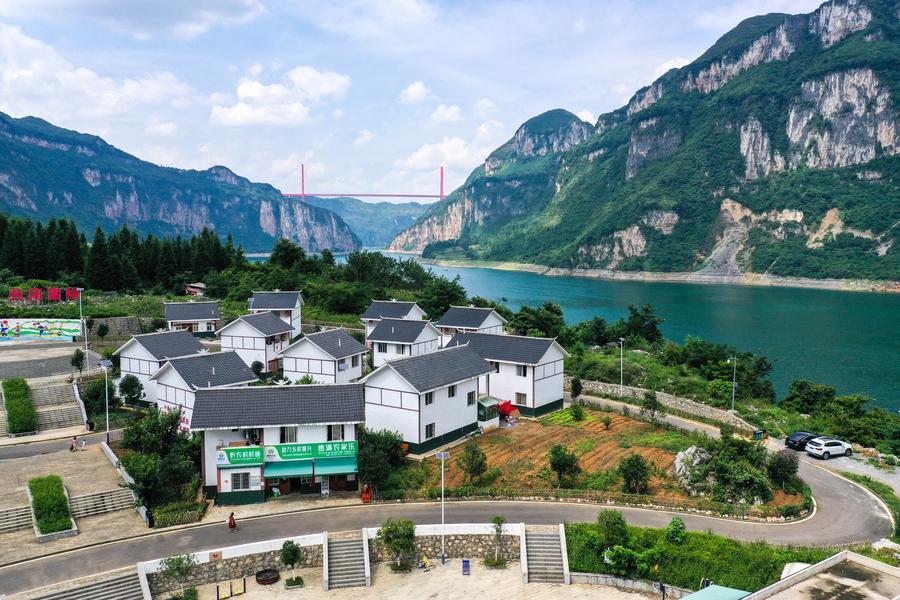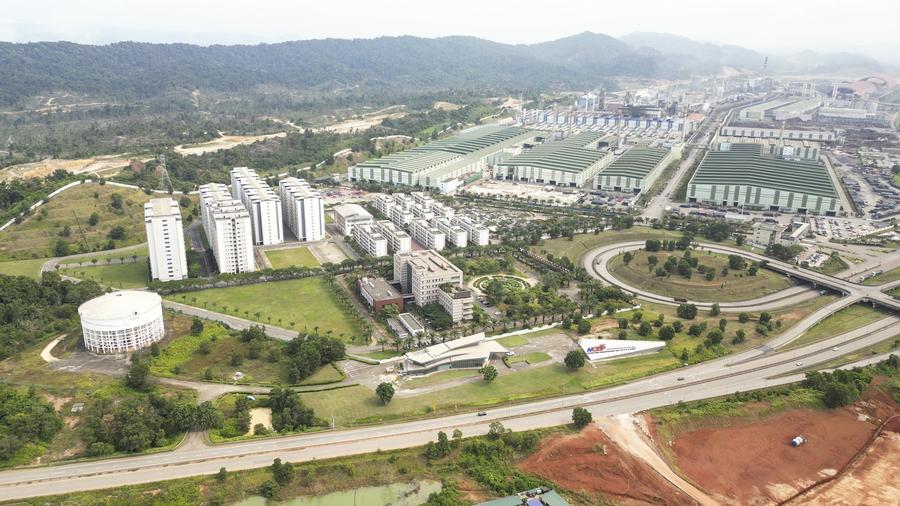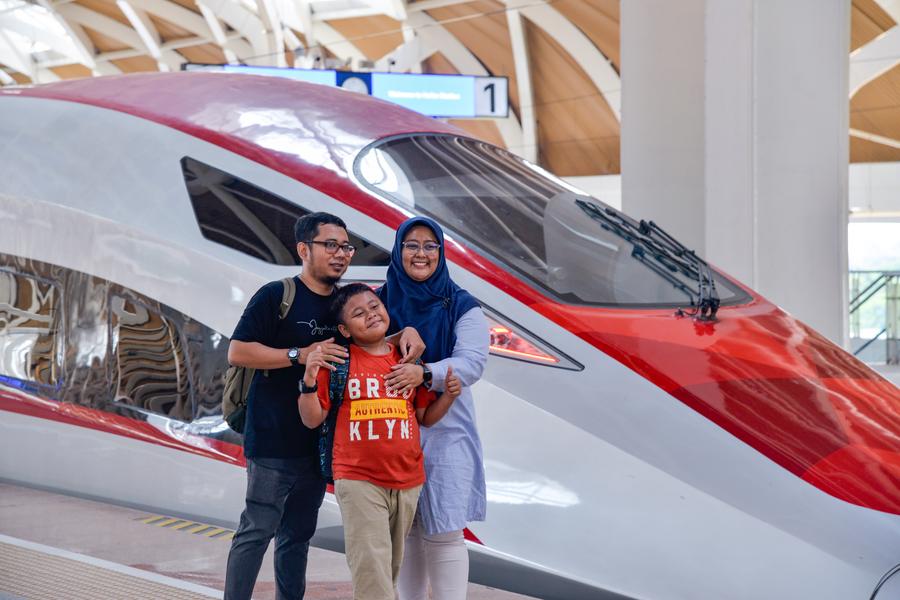


An aerial drone photo taken on July 24, 2021 shows a view of a relocation site for poverty alleviation at Huawu Village in Xinren Miao Township, Qianxi City, southwest China's Guizhou Province. (Xinhua/Yang Wenbin)
Many overseas observers have noted that, under Chinese President Xi Jinping's leadership, China will continue to sail with reaffirmed commitment to reform and opening-up.
In their interviews with Xinhua, overseas observers have regarded China's reform initiatives and its path of modernization as valuable lessons for the developing world.
BEIJING, July 17 (Xinhua) -- "Today, the Chinese people can say with great pride that reform and opening-up, China's second revolution if you like, has not only profoundly changed the country but also greatly influenced the whole world," said Chinese President Xi Jinping at the opening ceremony of the Boao Forum for Asia annual conference in 2018.
This statement was made as China was commemorating the 40th anniversary of its reform and opening-up, which has long been described as a "crucial move" that has made China what it is.
As the Third Plenary Session of the 20th Communist Party of China (CPC) Central Committee is being held in Beijing from Monday to Thursday, observers are particularly keen to gain insights from Xi's perspective on deepening reforms.
Many overseas observers have noted that, under Xi's leadership, China will continue to sail with reaffirmed commitment to reform and opening-up.
ACT BOLDLY and PROGRESS STEADILY
Advancing reform in a country of 1.4 billion people is extremely challenging.
"It can be said that the easy part of the job has been done to the satisfaction of all. What is left are tough bones that are hard to chew. This requires us to act boldly and progress steadily," Xi said in an interview with foreign media in 2014.
Reform is driven by problems and deepens through solving these problems, said Hwang Jaeho, director of South Korea's Institute for Global Strategy and Cooperation.
Xi's statement on "acting boldly and progressing steadily" to tackle new problems in the process of reform "left a deep impression on me," said Hwang. He also noted that in that same interview with foreign media, Xi expressed "full confidence in the prospects for China's development."
Charles Onunaiju, director of the Center for China Studies in Nigeria, said that a visionary leader must have the foresight and insight to perceive the opportunities and the challenges to improve society.

An aerial drone photo taken on June 13, 2024 shows the Malaysia-China Kuantan Industrial Park (MCKIP) in Pahang state of Malaysia. (Xinhua/Cheng Yiheng)
In this regard, he said, Xi not only seizes the opportunities presented by reforms but also adeptly manages the associated risks and challenges, taking necessary measures.
For over a decade, Xi has spearheaded over 3,000 reform plans across various sectors, including the economy, politics, culture, society, ecology, party building, national defense, and the military.
Paul Frimpong, executive director of the China-Africa Center for Policy and Advisory, noted that the reforms led by Xi have covered a wide range of fields, and have responded to the internal and external challenges facing China timely and effectively.
Over the past years, China's reform has made solid progress and continuous breakthroughs in various fields. Erik Solheim, co-chair of the Europe-Asia Center and former under-secretary-general of the United Nations, spoke highly of China's achievement on green development.
"China is now the core of global green development and an indispensable force in the global green transformation," said Solheim, noting that countries seeking green development without cooperating with China will "pay more time and cost."
CHINESE WISDOM, VALUABLE LESSONS
In their interviews with Xinhua, overseas observers have regarded China's reform initiatives and its path of modernization as valuable lessons for the developing world.
Since the 18th CPC National Congress, China's comprehensive deepening of reforms has advanced with a focus on the people's welfare. Xi has emphasized that the ultimate goal of reform is for the people's well-being, pledging to make people's priorities his own and act on their wishes.
The people-centered approach is reflected in the institutional arrangement of equity and justice and the practical style of hard work, said Chea Munyrith, president of the Cambodian Chinese Evolution Researcher Association.
Humphrey Moshi, director of the Center for Chinese Studies at the University of Dar es Salaam of Tanzania, said that the people-centered development concept has achieved remarkable results in various fields such as medical care, education, poverty alleviation, and rural development in China.
"Whilst President Xi's people are the Chinese people, it is also the people of the world," said Stephen Perry, Stephen Perry, honorary president of Britain's 48 Group Club.
Xi understands "the dialectic and contradiction" and is capable of "finding the ways forward and through the maze of Marxism" for China's development, said Perry.
During his state visit to Kazakhstan early this month, Xi and Kazakh President Kassym-Jomart Tokayev presided over the opening ceremony of a road transport route to a Caspian Sea port via video link, bolstering Kazakhstan's efforts to improve its connectivity.

Passengers pose for photos with a high-speed electrical multiple unit (EMU) train of the Jakarta-Bandung high-speed railway on the platform of Halim Station in Jakarta, Indonesia, April 17, 2024. (Xinhua/Xu Qin)
Xi first proposed the initiative of the Silk Road Economic Belt, an essential component of the Belt and Road Initiative (BRI), in September 2013 in Kazakhstan.
So far, China has signed BRI cooperation agreements with more than 150 countries and over 30 international organizations.
International observers have lauded President Xi's vision of building a community with a shared future for humanity. They say the initiatives proposed by China, including the BRI, the Global Development Initiative, the Global Security Initiative, and the Global Civilization Initiative, have reflected China's wisdom in addressing global challenges and its blueprint for advancing human civilization.
Former Ecuadorian President Guillermo Lasso noted that by proposing the initiatives, China has demonstrated its role as a responsible major country and provided inspiration for countries to engage in dialogue on an equal footing and achieve peace and development.
Koh King Kee, president of the Center for New Inclusive Asia of Malaysia, offered a critical perspective on the post-World War II global governance system, which he argued was established and dominated by the West to safeguard its own interests. Koh said nations have been compelled to align with Western directives or risk being seen as adversaries.
In contrast, Koh highlighted China's vision of building a community with a shared future for mankind as an inclusive alternative.
Koh said this concept transcends national boundaries and addresses the international system from a universal human perspective.
点击右上角![]() 微信好友
微信好友
 朋友圈
朋友圈

请使用浏览器分享功能进行分享
